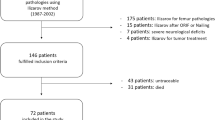Abstract
Background
The treatment of large posttraumatic tibial bone defects using the Ilizarov method was shown to be successful in several studies. These studies, however, typically focus on the radiological and functional outcome using objective parameters only. The aim of the present study was therefore to assess the objective and subjective outcome of a consecutive series of patients with large posttraumatic tibial bone defects using the Ilizarov method. Additionally, it was our goal to assess the physical and mental stress for the patients and their relatives during the long treatment period and the general health status at final follow-up.
Methods
A consecutive series of 15 patients with posttraumatic tibial bone defects of >30 mm after sustaining open tibial fractures and failure of internal fixation was included. The objective outcome was assessed at final follow-up using Paley’s criteria. For the assessment of the subjective outcome, all patients were asked to evaluate their satisfaction with the function of the lower leg, the cosmetic appearance and overall outcome as well. The physical and mental stress of the treatment for the patients and the nearest relative of patients were assessed at the time of frame removal using a custom-made questionnaire. The SF-36 was used to evaluate the general health status at final follow-up.
Results
Solid bone union with stable soft tissue coverage and eradication of infection was achieved in all patients despite a high complication rate. The functional outcome at final follow-up was excellent or good in all patients. The patients’ satisfaction with the overall outcome and the function of the lower extremity was high as well. The fear of amputation and complications was the major subjective burden for both the patients and their relatives. The long external fixation time is another relevant issue.
Conclusion
The Ilizarov method is a safe option for the treatment of large posttraumatic tibial bone defects after failure of internal fixation despite the high complication rate. It is essential to comment this to the patients and their relatives prior to the application of the frame increase their compliance with the long and emotionally draining treatment. The Ilizarov method is worth the effort only in patients, who will presumably comply with this treatment option and all of its drawbacks.


Similar content being viewed by others

References
Beris AE, Lykissas MG, Korompilias AV, Vekris MD, Mitsionis GI, Malizos KN, Soucacos PN (2011) Vascularized fibula transfer for lower limb reconstruction. Microsurgery 31:205–211
Bobroff GD, Gold S, Zinar D (2003) Ten year experience with use of Ilizarov bone transport for tibial defects. Bull Hosp Jt Dis 61:101–107
Bumbaširević M, Tomić S, Lešić A, Milosevic I, Atkinson HDE (2010) War-related infected tibial nonunion with bone and soft-tissue loss treated with bone transport using the Ilizarov method. Arch Orthop Trauma Surg 130:739–749
Emara KM, Allam MF (2008) Ilizarov external fixation and then nailing in management of infected nonunions of the tibial shaft. J Trauma 65:685–691
Eralp L, Kocaoğlu M, Ozkan K, Tuerker M (2004) A comparison of two osteotomy techniques for tibial lengthening. Arch Orthop Trauma Surg 124:298–300
Giannoudis PV, Faour O, Goff T, Kanakaris N, Dimitriou R (2011) Masquelet technique for the treatment of bone defects: tips-tricks and future directions. Injury 42:591–598
Ilizarov GA (1989) The tension-stress effect on the genesis and growth of tissues. Part I. The influence of stability of fixation and soft-tissue preservation. Clin Orthop Rel Res 238:249–281
Magadum MP, Basavaraj Yadav CM, Phaneesha MS, Ramesh LJ (2006) Acute compression and lengthening by the Ilizarov technique for infected nonunion of the tibia with large bone defects. J Orthop Surg (Hong Kong) 14:273–279
Mahaluxmivala J, Nadarajah R, Allen PW, Hill RA (2005) Ilizarov external fixator: acute shortening and lengthening versus bone transport in the management of tibial non-unions. Injury 36:662–668
Malizos KN, Zalavras CG, Soucacos PN, Beris AE, Urbaniak JR (2004) Free vascularized fibular grafts for reconstruction of skeletal defects. J Am Acad Orthop Surg 12:360–369
McHorney CA, Ware JE, Lu JF, Sherbourne CD (1994) The MOS 36-item Short-Form Health Survey (SF-36): iII. Tests of data quality, scaling assumptions, and reliability across diverse patient groups. Med Care 32:40–66
McKee MD, Yoo DJ, Zdero R, Dupere M, Wild L, Schemitsch EH, Mahoney J (2008) Combined single-stage osseous and soft tissue reconstruction of the tibia with the Ilizarov method and tissue transfer. J Orthop Trauma 22:183–189
Meagher PJ, Morrison WA (2002) Free fibula flap-donor-site morbidity: case report and review of the literature. J Reconstr Microsurg 18:465–468
Paley D (1990) Problems, obstacles, and complications of limb lengthening by the Ilizarov technique. Clin Orthop Relat Res 250:81–104
Paley D, Catagni MA, Argnani F, Villa A, Benedetti GB, Cattaneo R (1989) Ilizarov treatment of tibial nonunions with bone loss. Clin Orthop Relat Res 241:146–165
Paley D, Maar DC (2000) Ilizarov bone transport treatment for tibial defects. J Orthop Trauma 14:76–85
Pape HC, Pufe T (2010) Bone defects and nonunions -What role does vascularity play in filling the gap? Injury 41:553–554
Song HR, Cho SH, Koo KH, Jeong ST, Park YJ, Ko JH (1998) Tibial bone defects treated by internal bone transport using the Ilizarov method. Int Orthop 22:293–297
Taha W, Blachut P, Meek R, MacLeod M (2003) Intramedullary Nailing and Ipsilateral Fibular Transfer for the Reconstruction of Segmental Tibial Bone Defects. Operat Orthop Traumat 15:188–207
Wardak MM, Wardak E (2010) Percutaneous Gigli saw osteotomy. Operat Orthop Trauma 22:414–420
Wu C–C, Chen W-J (2003) Tibial lengthening: technique for speedy lengthening by external fixation and secondary internal fixation. J Trauma 54:1159–1165
Conflict of interest
No author has a conflict of interest that relates to the content discussed in this manuscript.
Author information
Authors and Affiliations
Corresponding author
Rights and permissions
About this article
Cite this article
Krappinger, D., Irenberger, A., Zegg, M. et al. Treatment of large posttraumatic tibial bone defects using the Ilizarov method: a subjective outcome assessment. Arch Orthop Trauma Surg 133, 789–795 (2013). https://doi.org/10.1007/s00402-013-1712-y
Received:
Published:
Issue Date:
DOI: https://doi.org/10.1007/s00402-013-1712-y



